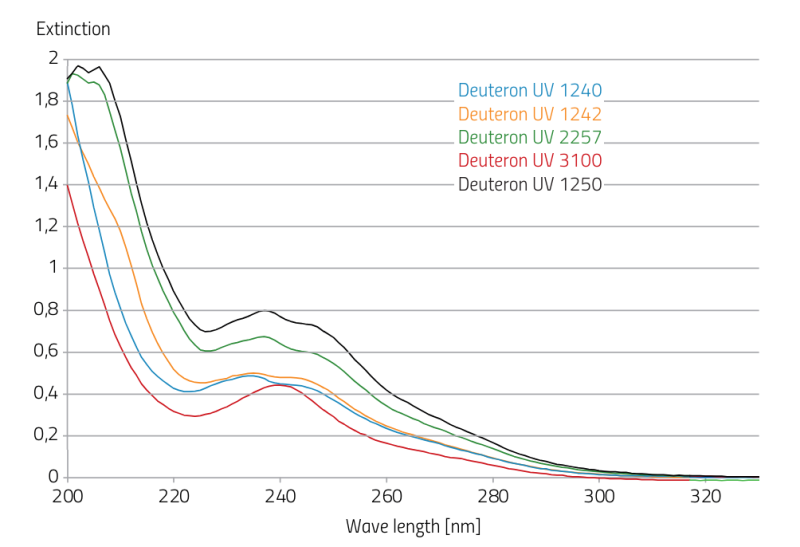Enhanced TDS
Identification & Functionality
- Carrier
- CASE Ingredients Functions
- Composite Materials Functions
- Technologies
- Product Families
- Chemical Structure

Bis-(4-dodecylphenyl) iodonium hexafluoro phosphate
Free from Antimony, less odorous than UV 2257
Features & Benefits
- Labeling Claims
- CASE Ingredients Features
- Materials Features
- Product Highlights
- The photoinitiator Deuteron® UV 3100 hardens binder systems that polymerise cationically under UV exposure. Deuteron® UV 3101 is soluble in these binder systems including the usual solvents and reactive diluents. The start of polymerisation is initiated by exposure to UV light in the wavelength range of 220 to 250 nm.
- The maximum absorption is about 240 nm. Its own colour disappears when it is exposed to light so that for all practical purposes there is not any impairment of colour by using Deuteron® UV 3100. The handling is unproblematic at a normal daylight.
The initiator has the following benefits in relation to other initiators:
- no benzene emission
- only slight odour
- no heavy metals
Deuteron® UV 3100 does not have a negative effect on film shrinkage because it contents no volatile solvents.
Applications & Uses
- Markets
- Applications
- Compatible Substrates & Surfaces
- Cure Method
- Coating End Applications
- Ink & Toner End Applications
- Use Level
- max. 1 %
- Application and Dosage Information
- The photoinitiator Deuteron® UV 3100 hardens binder systems that polymerise cationically under UV exposure. Deuteron® UV 3101 is soluble in these binder systems including the usual solvents and reactive diluents. The start of polymerisation is initiated by exposure to UV light in the wavelength range of 220 to 250 nm.
- The maximum absorption is about 240 nm. Its own color disappears when it is exposed to light so that for all practical purposes there is not any impairment of color by using Deuteron® UV 3100. The handling is unproblematic at a normal daylight.
The initiator has the following benefits in relation to other initiators:
- no benzene emission
- only slight odor
- no heavy metals
Deuteron® UV 3100 does not have a negative effect on film shrinkage because it contents no volatile solvents.
Properties
- Physical Form
- Appearance
- Red viscose liquid
- Typical Properties
Value Units Test Method / Conditions Density approx. 1.1 g/cm³ - Flash Point min. 100 °C - Concentration (Active Ingredient) approx. 40 % -
Regulatory & Compliance
- Certifications & Compliance
Technical Details & Test Data
- Absorption Range Data
Like different radical photoinitiators, cationic photoinitiators, which in our case are based on different molecular configurations around the iodine atom, have different absorption spectra. Our initiators have their absorption maximum at about 240 nm. Since the optimal wavelength ranges for initiation are therefore more in the short-wave range, Iron-doped Mercury vapor lamps, are suitable as UVC light sources. However, standard Mercury vapor lamps also emit a high proportion in the short-wave range.

Packaging & Availability
- Packaging Type
- Regional Availability
- Packaging Information
- Plastic canister (20 kg net)
Storage & Handling
- Shelf Life
- 1 year
- Storage and Shelf Life Conditions
- In original tightly closed containers under right storage conditions the product stability is up to 1 year.
- Do not expose to direct sunlight. Store at temperatures not under 10°C and, as possible, not over 35°C. Avoid contact with water.
